- Home
- Anna Carey
Once: An Eve Novel
Once: An Eve Novel Read online
once
ANNA CAREY
dedication
For my family (from Baltimore to New York)
contents
Cover
Title Page
Dedication
One
Two
Three
Four
Five
Six
Seven
Eight
Nine
Ten
Eleven
Twelve
Thirteen
Fourteen
Fifteen
Sixteen
Seventeen
Eighteen
Nineteen
Twenty
Twenty-One
Twenty-Two
Twenty-Three
Twenty-Four
Twenty-Five
Twenty-Six
Twenty-Seven
Twenty-Eight
Twenty-Nine
Thirty
Thirty-One
Thirty-Two
Thirty-Three
Thirty-Four
Thirty-Five
Thirty-Six
Thirty-Seven
Thirty-Eight
Thirty-Nine
Forty
Forty-One
Forty-Two
Forty-Three
Acknowledgments
About the Author
Credits
Copyright
Back Ad
About the Publisher
one
I STARTED OVER THE ROCKS, CLUTCHING A KNIFE IN ONE hand. The beach was strewn with sun-battered boats, long since wrecked on shore. The ship before me had washed in just this morning. It stood twenty feet tall, nearly twice as large as the others. I climbed up its side, feeling the cool wind coming in off the water. The sky was still thick with fog.
As I wandered over the boat’s peeling deck, I felt Caleb beside me, his hand resting on the small of my back. He pointed at the sky, showing me the pelicans plummeting into the sea or the way the fog rolled over the mountains, covering everything with a layer of white. Sometimes I found myself speaking to him, muttering sweet, muted words only I could hear.
It had been nearly three months since I’d last seen him. I’d been living in Califia, the all-female settlement founded more than ten years before as a haven for women and girls in the wild. We had come from all over, crossing the Golden Gate Bridge into Marin County. Some had been widowed after the plague and no longer felt safe living alone. Some had escaped violent gangs who’d held them hostage. Others, like me, were escapees from the government Schools.
Growing up in that walled-in compound, I’d spent every day looking over the lake at the windowless building on the other side—the trade school where we would have gone after graduation. But the night before the ceremony, I found out my friends and I weren’t going to learn skills to contribute to The New America. With the population decimated by the plague, they didn’t need artists or teachers—they needed children, and we were destined to provide them. I barely escaped, only to discover my true fate was so much worse. As valedictorian of the School, I had been promised to the King as his future wife, to bring his heirs into the world. He would always be searching for me, wouldn’t stop until I was locked inside the walls of the City of Sand.
I climbed a ladder to the boat’s top cabin. Two chairs sat in front of a broken windshield and a metal steering wheel so rusted it no longer moved. Waterlogged papers were piled up in corners. I sorted through the cabinets underneath the controls, looking for cans of food, salvage able clothing, any tools or utensils I could bring back to town. I tucked a metal compass in my knapsack, along with some frayed plastic rope.
Down on the deck, I approached the main cabin, covering my nose with my shirt. I slid open the cracked glass door. Inside, the curtains were drawn. A corpse wrapped in a blanket lay on a couch, sunken into its moldy cushions. I moved quickly, careful to breathe through my mouth, and ran my flashlight over the cabinets, finding an unmarked can of food and some damp books. I was checking the damage to the books when the boat shifted slightly beneath my feet. Someone was shuffling around in the sleeping cabin below. I drew my knife and pressed myself against the wall beside the cabin door, listening to the footsteps.
The stairs below creaked. I gripped the knife. I could hear breathing on the other side of the door. Light streamed in between the curtains, a sliver of sun moving across the cabin wall. In an instant the door flew open. A figure rushed in. I grabbed his collar, sending him hurtling onto the floor. I jumped on top of him, my knees pressing his shoulders to the ground, the knife blade resting against the side of his neck.
“It’s me, it’s me!” Quinn’s dark eyes peered up at me. Her arms were pinned to the floor.
I sat back, feeling my heartbeat slow. “What are you doing here?”
“Same thing as you,” she said.
In the struggle, I’d let my shirt fall away from my mouth and nose, and the room’s putrid stink was choking me. I helped Quinn up as fast as I could. She brushed off her clothes as we stumbled outside, the stinging, salty air a relief.
“Look what I found.” She held up a pair of purple sneakers, their laces knotted together. The circular emblem on the ankles read CONVERSE ALL STAR. “I’m not trading these. Going to keep them for myself.”
“I don’t blame you.” I offered her a small smile. The canvas was miraculously intact, in great shape compared to most of the items I’d found. Califia used a barter system, and beyond that we all contributed in different ways—scavenging, cooking, growing crops, hunting, repairing the crumbling houses and storefronts. I had a post in the bookshop, restoring old novels and encyclopedias, lending extra copies, and offering reading tutorials for anyone interested.
A tiny cut had appeared on Quinn’s neck. She rubbed at it, smearing blood between her fingers. “I’m so sorry,” I said. “Maeve’s always warning me about Strays.” Maeve was one of the Founding Mothers, a term given to the eight women who had first settled in Marin. She had taken me in, letting me share a bedroom with her seven-year-old daughter, Lilac. During my first days in Califia, Maeve and I had gone out every morning to explore. She’d shown me which areas were safe and how to defend myself should I come across a Stray.
“I’ve been through worse,” Quinn said, letting out a low laugh. She climbed down the side of the boat to the beach. She was shorter than most of the women in Califia, with curly black hair and tiny features crowded in the center of her heart-shaped face. She lived in a houseboat on the bay with two other women, and they spent most of their days hunting in the thick woods around the settlement, bringing back deer and wild boar.
She helped me cross the rocky beach, her dark eyes studying my face. “How are you holding up?”
I watched the waves hit the sand, the water white and relentless. “Much better. Each day it’s easier.” I tried to sound buoyant, happy, but it was only partially true. When I’d first arrived in Califia, Caleb had been by my side, his leg wounded from an encounter with the King’s troops. But he wasn’t allowed in. No men were—it was a rule. Caleb had known all along, and had brought me here not so we could be together, but because he thought it was the only place I’d be safe. I’d waited all this time to hear word of him, but he hadn’t sent a message to me through the Trail, the secret network that connected escapees and rebels. He hadn’t left word with the guards at the gate.
“You’ve only been here a few months. It takes time to forget.” Quinn rested her hand on my shoulder, leading me toward the edge of the beach, where the back wheel of her bike stuck out of the dune grass.
Those first weeks I’d been in Califia, I was hardly present. I’d sit with the women at dinner, pushing soft white fish around my plate,
only half listening to the conversations going on around me. Quinn was the one who’d first drawn me out. We’d spend afternoons in a restored restaurant near the bay, drinking beer the women brewed in plastic pails. She told me about her School, about how she’d escaped by crawling out a broken window and stalking the gate, waiting for the supply trucks to make their weekly delivery. I told her about the months I’d spent on the run. The other women knew the broad strokes of my story—an encoded message detailing the murders in Sedona had already come through the radio used by the Trail. The women knew the King was after me, and they had seen the injured boy I’d helped across the bridge. But in the quiet of the restaurant I’d told Quinn everything about Caleb and Arden and Pip.
“That’s what I’m worried about,” I said. Already the past was receding, the details of what had happened growing hazier each day I was in Califia. It was getting harder to remember Pip’s laugh or the green of Caleb’s eyes.
“I know how you feel about him,” Quinn said, working at a knot in her black hair. Her caramel skin was flawless except for the small dry patch along her nose, red and peeling from the sun. “But things will get easier. You just need time.”
I stepped onto a piece of driftwood, feeling satisfied when it snapped in half. We were the lucky ones—I knew that. Every time I peered down the table at meals, I thought about all we’d escaped from, how many girls were still stuck in the Schools and how many more were under the King’s control in the City of Sand. But knowing I was safe didn’t stop the nightmares: Caleb, alone in some room, blood in a dry, black pool around his legs. The images were so vivid they woke me, my heart knocking in my chest, the sheets damp with sweat. “I just want to know if he’s alive,” I managed.
“You might never know,” Quinn said, shrugging. “I left people behind. A friend of mine was caught while we were escaping. I used to think about her, obsess about what I could’ve done. Could we have gone out a different exit? What if I was the one trailing behind? Memories can ruin you if you let them.”
That was my cue from Quinn: Enough. I’d already stopped talking about it with everyone else. Instead, I carried the thoughts like stones, holding them to feel their weight. No more thinking about the past, Maeve had told me one day. Everyone here has something to forget.
We walked along the edge of the beach, our feet swallowed by the sand. Gulls circled above. My bike was hidden on the other side of the hill. I pulled it from beneath a prickly shrub and started toward Quinn. She sat on hers, one foot resting on a pedal, tying back her curly hair with a piece of twine. She was wearing a loose turquoise T-shirt, I ♥ NY printed on it in block letters. It rode up in the front, exposing the top of the pink scars that crisscrossed her abdomen. She’d told me how she’d escaped, but she wouldn’t talk about the three years she’d spent inside the School, or the children she’d had there. I let my eyes linger on the swollen lines, thinking of Ruby and Pip.
We started up the road, pedaling in silence, the only sound the wind rustling the trees. Parts of the mountain had crumbled onto the pavement, leaving piles of rocks and branches that threatened to burst our tires. I concentrated on maneuvering through them.
Somewhere far off, a shout split the air.
I glanced over my shoulder, trying to figure out where it had come from. The beach was empty and the tide was coming in, the rocks and sand caught in the endless churning of the waves. Quinn moved off the road, finding cover behind the thick trees, and gestured for me to follow. We huddled together in the overgrowth, our knives out, until a figure finally appeared on the road.
Harriet slowly came into view, her face twisted and strange as she rode toward us on her bike. She was one of the gardeners who distributed fresh herbs and vegetables to Califia’s restaurants. She always smelled of mint. “Harriet—what’s wrong?” Quinn called, immediately lowering her knife.
Harriet hopped off her bike and walked toward us, her hair a wild mess from the wind. She leaned forward and rested her hands on her knees as she struggled to catch her breath. “There’s been movement in the city. Someone’s on the other side of the bridge.”
Quinn turned to me. Since I’d arrived, guards had stood at the entrance to Califia, scanning the ruined city of San Francisco, looking for signs of the King’s troops. But no lights had been spotted. No Jeeps, no men.
Until now.
Quinn grabbed her bike from the underbrush and started up the road, pulling me along. “They’ve found you,” she said. “There’s not much time.”
two
HARRIET PEDALED AROUND THE BEND. “THIS IS WHY WE HAVE A plan,” Quinn said, speeding alongside me so I could hear her. She glanced sideways, a few matted black curls blown in her eyes. “You’re going to be fine.”
“I don’t feel fine,” I said, turning so she couldn’t see my face. My chest was tight, each breath short and painful. I’d been discovered. The King was close, and coming closer still.
Quinn leaned into a sharp turn. The edge of the pavement, a crumbling cliff fifty feet high, was only a few feet away. I held tight to the handlebars, now slippery with sweat, as we climbed the road to the bridge. It was rumored that the regime knew about the community of women nestled in the hills of Sausalito. They believed it to be a small group of female Strays, not a hidden depository for the Trail. The last time they had come through to check on the settlement was nearly five years ago, and the women had scattered into the hills, hiding out for the night. The soldiers had passed their houses and apartments, not noticing the shelters camouflaged by blankets of overgrown ivy.
The bridge came into view ahead. The towering red structure had been the site of a huge fire. It was piled with burned cars, debris from fallen beams and cables, and the skeletons of those who’d been trapped there while trying to escape the city. I held onto Quinn’s words: This is why we have a plan. If troops were spotted, Quinn and I would leave Sausalito, not stopping until we were deep in the labyrinth of Muir Woods, where an underground bunker had been built years ago. I would stay there, relying on stockpiled supplies, while the soldiers swept through Califia. The rest of the women would move west, up toward Stinson Beach, where they’d wait out the invasion in an abandoned motel. They’d be in enough danger if the settlement were discovered … much more if the soldiers found out they’d been hiding me from the King.
“There’s movement on the other side,” Isis called out from Califia’s entrance, hidden behind a patch of dense shrubs. She was leaning over the stone ledge, her black hair tied back with a bandanna, a pair of binoculars in her hand. We let the bikes fall and gathered around her. Maeve was perched over the trapdoor behind the ledge, doling out extra rifles and ammunition.
Maeve pressed a gun into Harriet’s hands, then handed another to Quinn. “Line up against the wall.” All the women followed her lead. She was one of the youngest Founding Mothers, and the most vocal about what was expected of everyone in the settlement. Tall, with ropy muscles and braided blond hair, Maeve looked exactly the same as she did the day I’d first met her, standing outside Califia’s entrance. She was the one who’d turned Caleb away. I’d accepted the room in her house, the food and clothing she’d given me, the post she’d found for me at the bookstore, knowing it was her way of saying what couldn’t be spoken: I’m sorry, but I had to.
I took a rifle and joined the rest of the women, feeling the cold weight of the gun in my hands. I remembered what Caleb had said, back when I was staying at his camp: Killing a New American soldier is an offense punishable by death. I thought of the two soldiers I’d shot in self-defense. We’d left their bodies on the road beside their government Jeep. I’d held the third soldier at gunpoint, forcing him to drive us toward Califia, his hands trembling on the wheel. Caleb had slumped against the backseat, his leg bleeding where he’d been stabbed. The soldier had been younger than me—I let him go when we were right outside San Francisco. “Maeve, do we need the guns? We shouldn’t use—”
“If they discover the escapees they’ll drag the
m all back to their Schools, where the girls will spend the next years pregnant and on so many drugs they won’t even remember their names. That’s not an option.” She walked along the row of women, pressing each of their shoulders forward to adjust their aim.
I looked down the barrel, out across the bridge and the gray ocean, trying not to dwell on Maeve’s omissions. She didn’t mention what would happen to me. Instead, the statement had the slight tone of an accusation—as if I had personally invited the soldiers here.
We kept our eyes ahead. I listened to the sound of Harriet’s breathing as the figures made their way over the bridge. From such a distance I could only see two dark shapes, one smaller than the other, moving between the burned cars. After a moment, Isis set down the binoculars. “There’s a dog with him,” she said. “A Rottweiler.”
Maeve took the binoculars. “Keep your aim, and if there’s any aggression, don’t hesitate to shoot.” The two figures moved closer. The man was hunched over, his black shirt camouflaging him against the charred pavement.
“He isn’t wearing a uniform.” Quinn eased her grip on her gun.
Maeve kept the binoculars to her face. “That doesn’t mean anything. We’ve seen them out of uniform before.” I studied the figure, looking for any resemblance to Caleb.

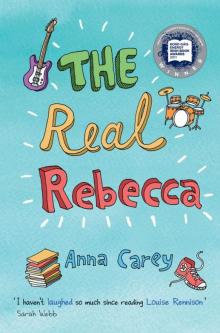 The Real Rebecca
The Real Rebecca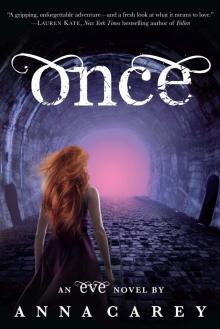 Once
Once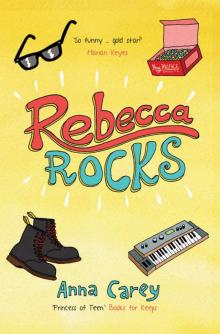 Rebecca Rocks
Rebecca Rocks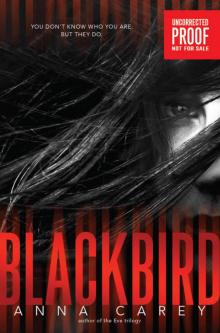 Blackbird
Blackbird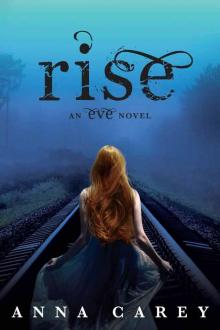 Rise
Rise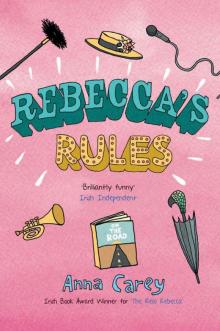 Rebecca's Rules
Rebecca's Rules Deadfall
Deadfall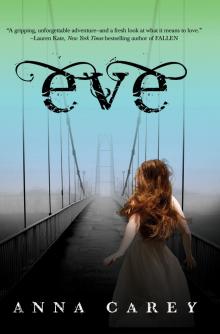 Eve
Eve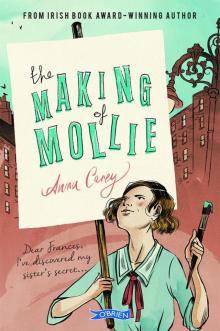 The Making of Mollie
The Making of Mollie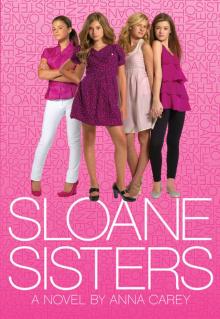 Sloane Sisters
Sloane Sisters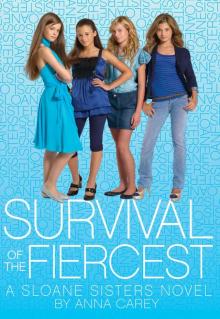 Survival of the Fiercest
Survival of the Fiercest This Is Not the Jess Show
This Is Not the Jess Show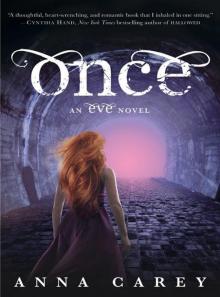 Once: An Eve Novel
Once: An Eve Novel